#errand of mercy
Text

#spirk#affixjoy this one is for you#star trek#star trek tos#star trek the original series#s'chn t'gai spock#tos spock#errand of mercy#james t kirk#jim kirk#star trek meme#magpie posts
2K notes
·
View notes
Text
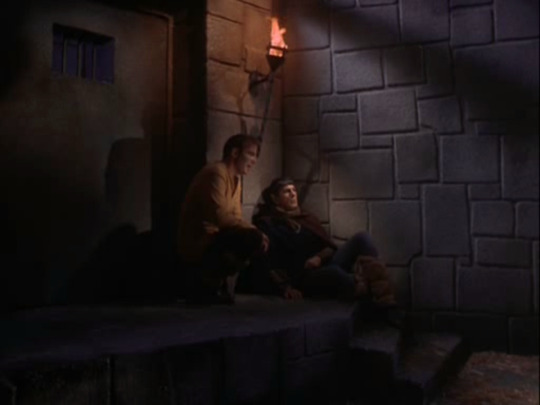
You're in a prison cell with a beautiful Vulcan and you're trying not to tell him that you love him
#idk have a caption inspired by nimoy being too pretty lounging there & the infamous you are jeff poem by richard siken#star trek tos#errand of mercy#spock#jim kirk#spirk
500 notes
·
View notes
Text
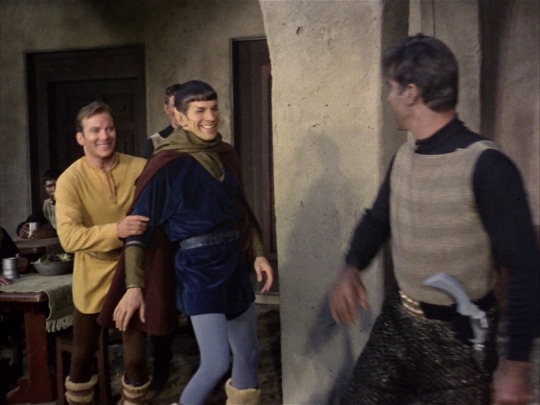
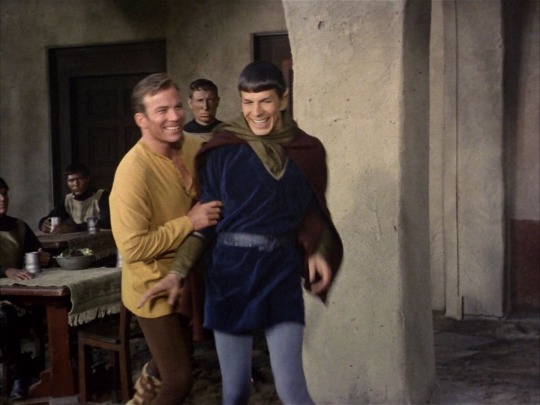

#star trek#faceapp#happy#kirk#jim kirk#james t kirk#captain kirk#spock#mr spock#commander spock#original series#the original series#star trek the original series#tos#star trek tos#errand of mercy
195 notes
·
View notes
Text



[ Star Trek : What If ] (iii-3)
ID:090222c
“Errand of the Merciless”
(This was the only episode of TOS that I had somehow missed smh)
← Previous | Next →
[ Part I ]
(My Star Trek: What If series. #ST:WI)
(The series name and ID help give each installment its unique reference title for organisational and convenience purposes. It is (iii), to mean which entry (and “3” to indicate “part 3” of the entry), and the ID as a condensed index code. If the number is the same, then the letter after, if present, will differ. The number can also differ entirely. All this is not that important, but just wanted to clarify in case people wondered).
(Art was livestreamed on my Twitch channel at “almalvo” - feel free to go follow with notifications to catch my art streams and for a chill time~)
#star trek#star trek art#ST:WI#star trek what if#kirk#kirk art#tos#tos art#kirk fan art#captain kirk#jim kirk#almalvo#errand of mercy#errand of the merciless#what if#shatner#william shatner#art#fan art#art series#series
327 notes
·
View notes
Text

In today's drawing(s), Spock models two of his most iconic spockfits.
#spocktober#spock#star trek#star trek tos#errand of mercy#city on the edge of forever#heem originals
32 notes
·
View notes
Text
Alright I’m now convinced this was intentional
Guys buckle in cuz it’s time for another installment of Kirk judges someone for doing something morally questionable for possibly good reasons and then finds himself doing something similar/faced with the same dilemma several episodes later.
First round it was the Menagerie and Conscience of the King
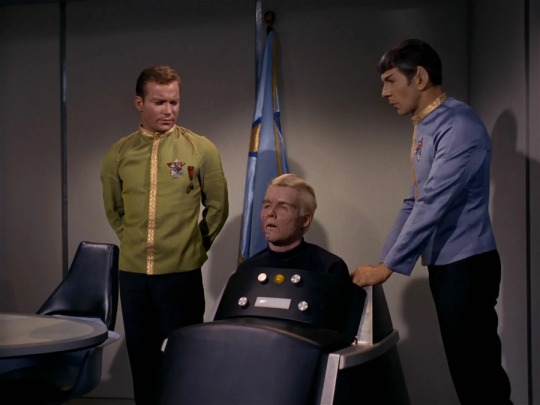
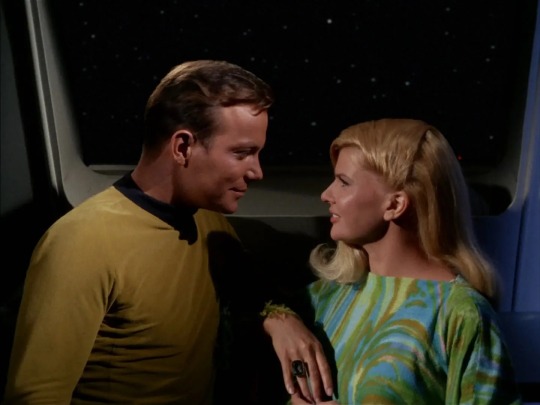
Kirk was mad at Spock for lying and hiding why he took the ship off course with Pike and then literally the next episode Kirk hides his intentions with Kodos as he takes the shop off course until he is confronted. Another fun contrast between the two is everyone except Kirk thinks Spock is acting weird in the Menagire before he explains himself, while in conscience of the king, only Spock notices Kirk is acting off and has to do digging on his own to figure out what is going on because Kirk refuses to explain.
Second round was a taste of Armageddon and the Errand of Mercy.
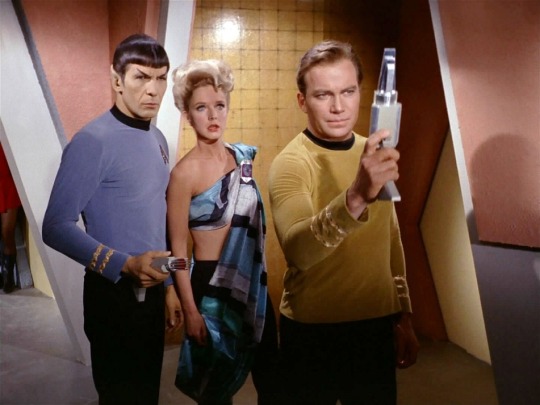
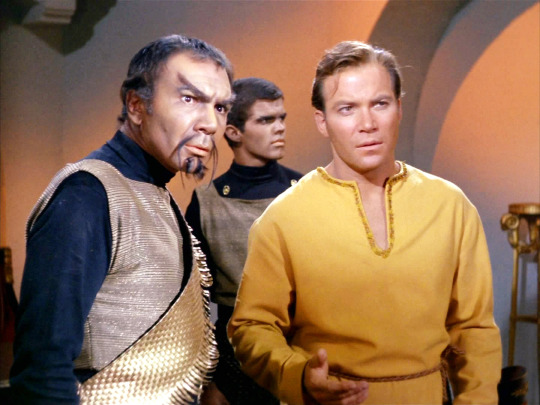
In the former, Kirk was pissed at the locals for fighting this war on computers, condemning 3 million to die every year, instead of going to the negotiation table and working this out. So he destroys the computer (their weapon of war) to force them to negotiate.
And then in the latter story, the locals of a planet take away Kirk and the Klingons’ ability to fight via disabling all their weapons across the entire galaxy in order to force a negotiation that both sides are hesitant to start.
And round three is Tomorrow is Yesterday and The City at the Edge of Forever.
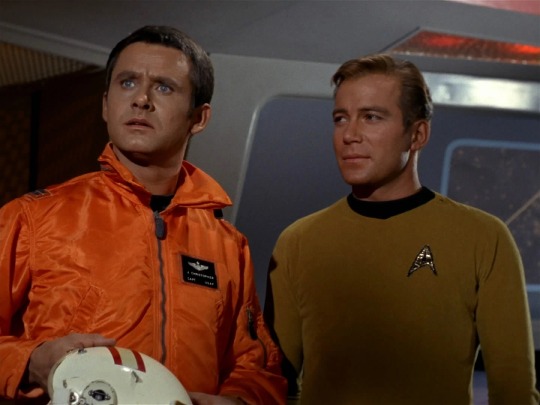
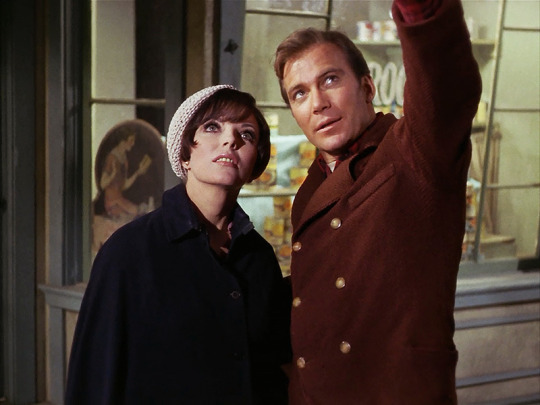
In the former, after the enterprise accidentally time travels, Kirk kidnaps some pilot b/c said pilot has seen their spaceship and could change the future. The pilot tries to escape several times to get back to his country and wife, not caring about the consequences, much to Kirk’s annoyance. And the episode ends with them erasing everything, even the events themselves so the timeline is restored.
And of course, in the latter story, Kirk is faced with the dilemma letting the woman he fell in love with die in order to restore the future, or saving her and condemning millions to die in a changed future. He chooses the former, and is so wrecked by this he curses for the first and last time in the whole tv series. And the episode ends not on a shot of the enterprise sailing away to its next location, but lingers on the time portal.
Edit: This one really gets me cuz that pilot was willing to break the timeline to be with his family, something extremely selfish, while Jim was able to let Edith die, sacrificing his personal happiness, saving the timeline.
Big picture is we can watch Kirk both see these dilemmas or actions from an outsiders perspective, and then later he either does the same thing or faced with the same situation personally. In short, it humanizes Kirk in a way that doesn’t make him an asshole.
I love this so much and I hope it continues.
Edit: so it didn’t really continue but I still really like this. You learn what kind of a person Jim Kirk is based on how he interacts with each given episode plot and how he deals with said plots in comparison to other people rather than him just monologuing about himself.
#star trek tos#the menagerie#conscience of the king#a taste of armageddon#errand of mercy#tomorrow is yesterday#the city at the edge of forever#Star Trek#james t kirk#jim kirk#star trek analysis#star trek meta
66 notes
·
View notes
Text

Star Trek 1x28 - "Errand of Mercy" Review
We watch corporealized non-corporeal beings smile condescendingly at two galactic powers slap fighting in the playground, maman. It's a sight to behold -- Plus, we meet the Klingons for the very first time! Strap in and go with us on this Errand of Mercy...
Episode Reviewed:
Star Trek 1x28 - "Errand of Mercy"
Hosts:
David C. Roberson
Effie Ophelders
Join Us:
Site: http://startrekucast.com
Apple: http://bit.ly/StuCast
Spotify: http://bit.ly/StarTrekUCast
Spreaker: http://bit.ly/StuCastSpreaker
#star trek#review#podcast#star trek podcast#podcasts#spotify#star trek podcasts#star trek review#errand of mercy#kor#klingons#star trek reviews#episode review#episode reaction#star trek tos#the original series#star trek the original series#david c roberson#effie ophelders#Spotify
12 notes
·
View notes
Text
Quite possibly the last one before college 😗
(But not the last one of all time, no no we’ve barely gotten started)

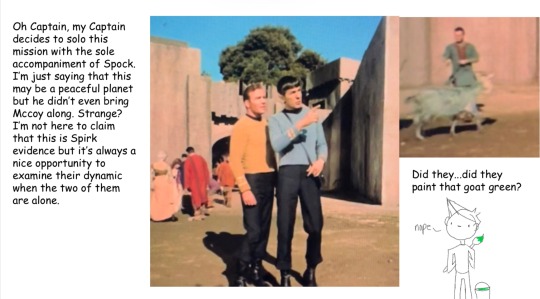
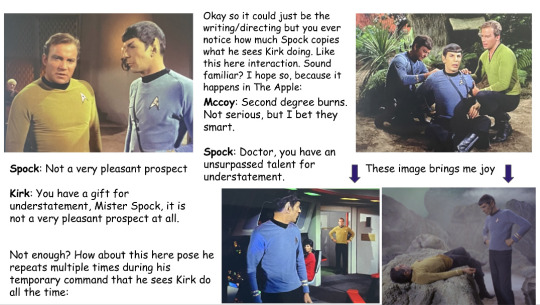



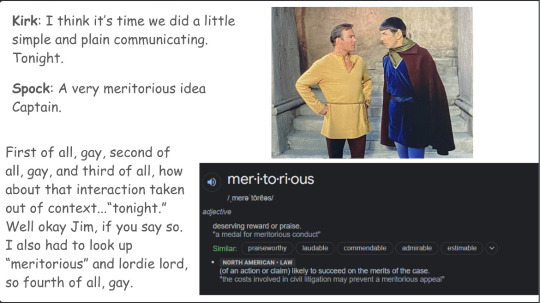




Hope y’all had a great summer! ☀️
#captain kirk#jim kirk#spirk: the lecture#k/s#spirk#spock#star trek#star trek tos#tos spirk#kirk#kirk x spock#spirk is canon#spock x kirk#tos kirk#tos spock#tos#commander spock#errand of mercy#this one has so many gifs and it took forever#worth it#i do this because I love y’all#but moreso because I love spirk with my last dying breathe
213 notes
·
View notes
Text
A common apologia for STAR TREK — particularly TOS, but extending to the newest shows as well — is that it wants or tries to be progressive, but is tripped up by the writers' unconscious biases or the ostensibly more backward social attitudes of its time (whatever time that may be). This argument is somewhat perplexing because STAR TREK has never been what you'd call subtle in expressing its liberal imperialist values, either in 1966–1968 or now.
The core of STAR TREK, which is explained clearly in Roddenberry's pitch and the TOS writer's bible (excerpted at some length in Stephen Whitfield's THE MAKING OF STAR TREK, inter alia), is a hybridization of Horatio Hornblower, the C.S. Forester adventure novels about a heroic British naval officer during the Napoleonic wars, and the American Western, a genre that still dominated a big swath of American TV drama in the period when STAR TREK was conceived. Roddenberry himself had previously written for some of those shows, in particular HAVE GUN, WILL TRAVEL, and his pitch line for STAR TREK was "WAGON TRAIN to the stars."
To its credit, STAR TREK ended up being about more than just that, but Roddenberry was very clear that at heart, the series was about extending the conquest of the American frontier to the stars. Of the Enterprise and the other ships of its class, Roddenberry said:
In addition to the twelve Starships, there are lesser classes of vessels, capable of operating over much more limited distances. They are involved in commercial ventures, survey work, archaeological expeditions, medical research, and so on. The Starships are the heavy cruisers, the ones which can best defend themselves as they probe farther and farther out, opening new areas … and then the others follow. [Whitfield, 204; emphasis added]
Because TOS avoids saying anything very substantive about civilian life and government outside of Starfleet, we actually know very little about factors may be driving this wave of colonialism. If Earth in the TOS-era is a post-scarcity paradise (which, it should be noted, the original show does not ever actually say), why leave home for a riskier, hardscrabble life on worlds like Rigel XII ("Mudd's Women") or Cestus III ("Arena")? Part of it is plainly capitalist interests: There are explicitly opportunities to strike it rich discovering or exploiting valuable resources (or fleecing those who have or hope to, as Harry Mudd does). The Federation is also keen to cement its political hold on worlds that are near the borders of rival empires; the plot of "The Trouble with Tribbles," for example, hinges on the Federation's determination to colonize Sherman's Planet, which is also claimed by the Klingon Empire.
However, these plot details are to some extent beside the point: The premise of STAR TREK, and of most Westerns, is that the importance and heroic necessity of colonizing and "developing" the frontier, bringing (white) civilization to the "savage" wilderness, is self-evident.
Much of STAR TREK is predicated on concepts of "social evolution," the idea that there are a series of consistently defined hierarchical stages from the primitive to the advanced. TOS often states this quite explicitly, but it has remained a key feature of the STAR TREK premise up to the present. This process of advancement is described as both natural and a matter of moral urgency: Kirk rails against the "stagnation" of less-advanced societies, and on multiple occasions argues that the importance of reversing stagnation (or devolution) justifies violating the Prime Directive with dramatic interventionist action to put a civilization back on what he considers the proper track.
The concepts of social evolution STAR TREK espouses are fundamentally racist — it's a philosophy that rationalizes colonial exploitation (and in the real world even slavery) — and play into the franchise's virulent anti-indigenous attitudes. Indeed, STAR TREK frequently takes an openly contemptuous view of "primitive" peoples, who in TOS are often presented as simpletons, either kindly child-men (e.g., "The Apple") or dangerous savages driven by quasi-animal cunning (as with some of the characters in "A Private Little War"). Probably the ugliest example in TOS is "The Paradise Syndrome, where Kirk loses his memory and falls in with a society of American Indians transported centuries earlier to a distant planet; the story emphasizes that, even deprived of the knowledge and technology of his century, Kirk is still the intellectual superior of the people around him (who of course are played by white actors in redface). However, this a recurring theme throughout STAR TREK: Indigenous species are consistently presented as something less than people unless their stage of advancement approximates that of 20th century Earth (as with the Roman proconsul in "Bread and Circuses," who is one of the very few indigenous "primitives" to be credited with any kind of intellectual sophistication). The application of the Prime Directive (which is wildly inconsistent and honored more in the breach than in the observance) is based not on respect for cultural differences, but on a patronizing desire to "protect" indigenous pre-warp civilizations from ideas that their primitive minds can't yet handle.
STAR TREK pays lip service to the idea of cultural and racial diversity, and the Vulcan slogan (in the third season of TOS) "Infinite Diversity in Infinite Combinations." However, what it most consistently espouses is the importance of ensuring the march of social evolution along orthodox lines and the eventual absorption of other races, cultures, and species into the Federation's (white American liberal) ideas of socioeconomic and technological progress. As Kirk says to Ayelborne in "Errand of Mercy":
KIRK: Gentlemen, I must get you to reconsider. We can be of immense help to you. In addition to military aid, we can send you specialists, technicians. We can show you how to feed a thousand people where one was fed before. We can help you build schools, educate the young in the latest technological and scientific skills. Your public facilities are almost nonexistent. We can help you remake your world, end disease, hunger, hardship. All we ask in return is that you let us help you. Now.
"Errand of Mercy" is notable in that Kirk's condescension toward the Organians proves to be ill-founded: What he and Spock assumed was a stagnant, primitive society is actually a kind of backyard bird feeder maintained by a vastly more advanced species that is trying very hard to be patient as Kirk and the Klingons strut around making pronouncements. At the end of the episode, Kirk admits openly that he's embarrassed at how badly he misread the situation. However, this doesn't ultimately lead him to question his presumptions about social progress; he simply admits that in this specific case, they were misapplied.
The result of "Errand of Mercy," as revealed in the second season of TOS, is a peace treaty between the Federation and Klingons that makes the show's endorsement of colonialism and economic imperialism that much clearer: As we're told in "The Trouble with Tribbles," under this new treaty, if there is a territorial dispute over a newly discovered or colonized world, "one side or the other must prove it can develop the planet most efficiently," with the ostensibly benevolent and freedom-loving Federation and the ostensibly "brutal and aggressive" Klingon Empire vying to determine who will be permitted to exploit that world and its resources. The exact role of the Organians in the framing of this treaty is unclear — they have no need of or interest in Federation-style economic development, and nothing in "Errand of Mercy" suggests that they see much value in it, although the Organians do say they find the prospect of a shooting war between the Federation and the Klingon Empire both morally objectionable and "intensely painful" — but its result is to more firmly establish the Cold War conflict between the Federation and Klingons as the competition of two rival colonial powers for control of valuable territory and resources. Their conflict is a primarily economic one, not really substantively based on what Kor calls the "minor ideological differences" between the two empires, which both Kor and the Organians regard as incidental. (Kirk takes issue with that contention, but as previously noted, Kirk has more than once used the explicit threat of planetary genocide to get what he wants, so Kor probably has a point here!)
Later STAR TREK shows are sometimes more self-conscious about these values, but they seldom actually question them, and there's really only so far that STAR TREK can move these load-bearing narrative elements without becoming something really fundamentally different than it is. Moreover, DISCOVERY, STRANGE NEW WORLDS, and PICARD have seemed committed to doubling down on many of the franchise's more disturbing ideological elements, while attempting to paper over viewer unease with appeals to nostalgia, faux-patriotism, and sentimentality.
#teevee#star trek#star trek tos#the making of star trek#gene roddenberry#stephen whitfield#errand of mercy#organians#the paradise syndrome#anti-indigenous racism
14 notes
·
View notes
Text

Errand of Mercy
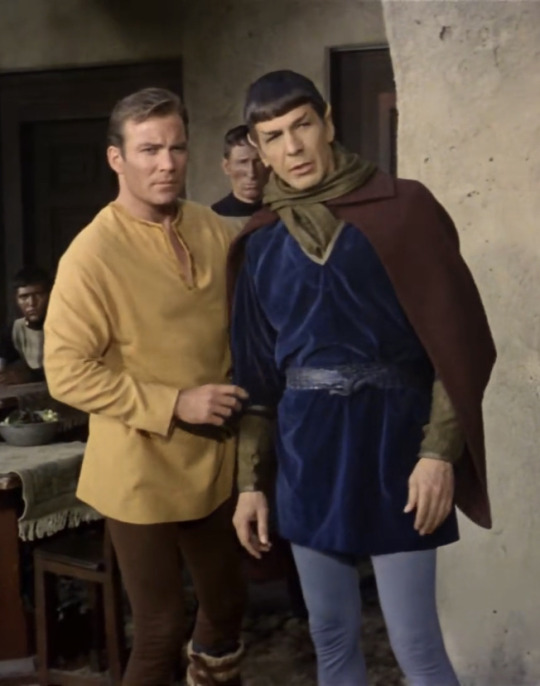
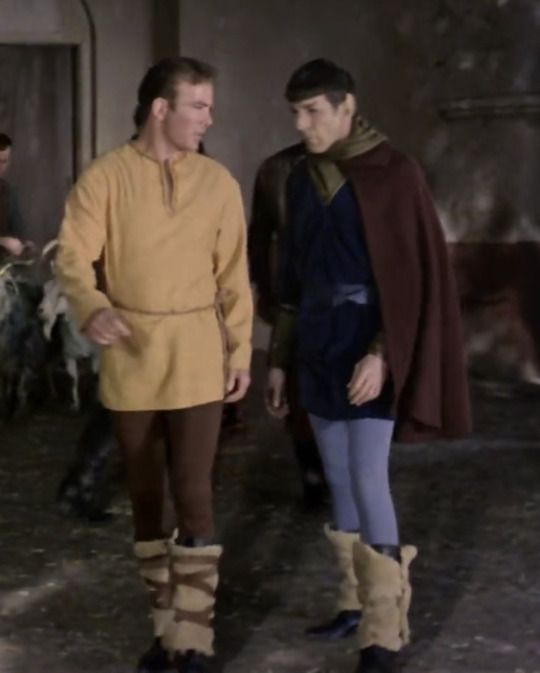
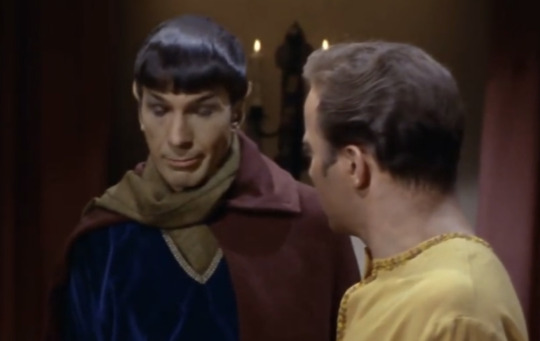
I’m so proud of these outfits!!!
#the adventures of keychain kirk and pocket spock#star trek#star trek the original series#spock#st tos#mr spock#captain kirk#spirk#jim kirk#errand of mercy#star trek fanart
111 notes
·
View notes
Text
Rewatched Errand of Mercy and currently dying over how intensely concerned Jim is over warning the Organians that they’re at risk of falling under dictatorial rule and losing their way of life. I know Trek never really went into Tarsus IV again after Conscience of the King to have been consciously incorporating Jim’s trauma from it into the character but boy can you still find painful nuggets in there.
#also do you ever just scream and die because you love jim a LOT#star trek#james kirk#tarsus iv#errand of mercy#conscience of the king
82 notes
·
View notes
Text
Kirk and Kor: We're going to have a war now.
Organians: No you're not.
Kirk and Kor: But, but we wanna.
Organians: Too bad.
20 notes
·
View notes
Text


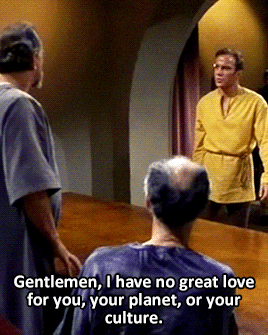

Star Trek: The Original Series | Errand of Mercy
#startrekedit#tosedit#star trek tos#jim kirk#errand of mercy#the fact that he just went complete 180 from what he said... wowwee#would've included the “but it's hopeless!” spirk eyebrow exchange but i have remade this set 3 times now#to redo it a fourth time... no no no#mine
223 notes
·
View notes
Text
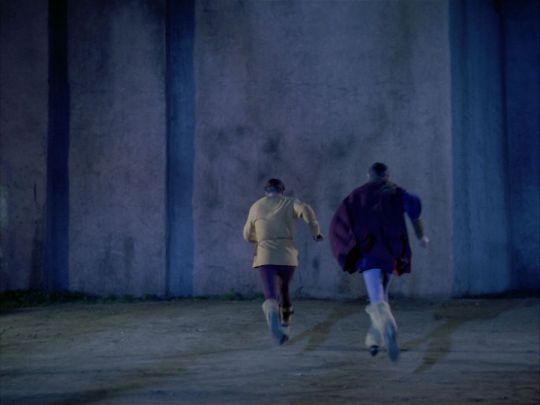

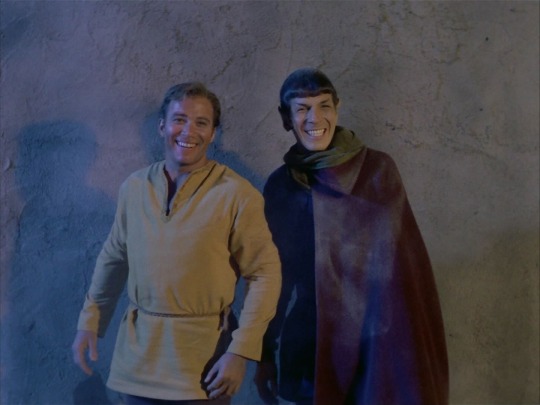
#star trek#faceapp#happy#kirk#jim kirk#james t kirk#captain kirk#spock#mr spock#commander spock#original series#the original series#star trek the original series#tos#star trek tos#errand of mercy
179 notes
·
View notes
Text

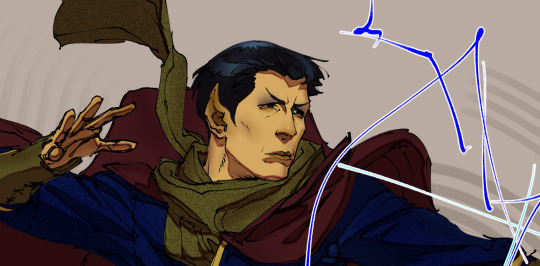
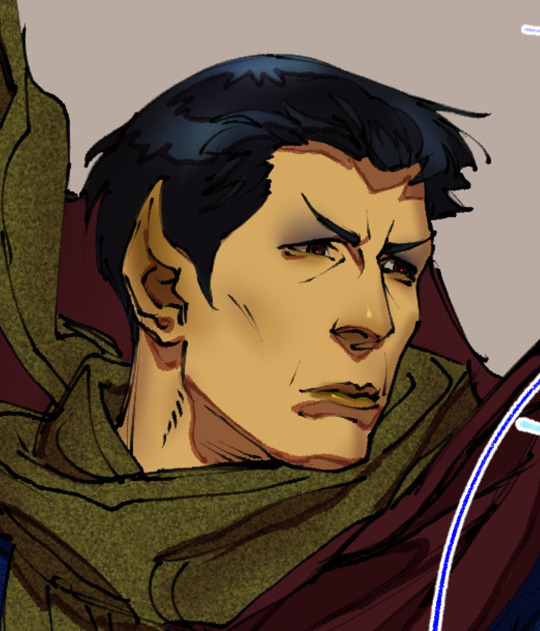
[ Star Trek : What If ] (iii-4)
ID:090222c
“Errand of the Merciless”
(This was the only episode of TOS that I had somehow missed smh)
← Previous | Next →
[ Part I ]
(My Star Trek: What If series. #ST:WI)
(The series name and ID help give each installment its unique reference title for organisational and convenience purposes. It is (iii), to mean which entry (and “4” to indicate “part 4” of the entry), and the ID as a condensed index code. If the number is the same, then the letter after, if present, will differ. The number can also differ entirely. All this is not that important, but just wanted to clarify in case people wondered).
(Art was livestreamed on my Twitch channel at “almalvo” - feel free to go follow with notifications to catch my art streams and for a chill time~)
#its his legs#kirk wants those skinny curves#star trek#star trek art#ST:WI#star trek what if#spock#spock art#tos#tos art#spock fan art#almalvo#errand of mercy#errand of the merciless#what if#nimoy#leonard nimoy#art#fan art#art series#series
290 notes
·
View notes
Text
(Re)Discovering A Strange New Spock: “Dagger of The Mind” (1x09)
Previous: Miri
Next: The Corbomite Maneuver
A meta anthology where I re-examine TOS, especially Spock, in light of the new information Discovery & Strange New Worlds has revealed about him to us.
Onto the Analysis!
Spock is A Massive Bigot Example 9000
Okay first things first I don’t want to EVER, and I mean EVER hear anything remotely resembling the words “Spock isn’t bigoted like McCoy” or “Vulcans are better than Humans” EVER AGAIN after the utter hypocritical nonsense Spock spews in the beginning of this episode!
“You earth people glorify organized violence for 40 centuries, but you imprison those who employ it privately.” First of all ‘YOU EARTH PEOPLE?!’ that’s really damn derogatory even for you Spock, son of Amanda Grayson the human from Earth.
Spock, my guy, my beloved bitchy lil’ blorbo. Vulcan tried to instigate at war with Andoria barely a century ago, you guys were On Sight with the Klingons for a long time before formal relations were established. Don’t act like Vulcans are above it all!
Also it’s bold of you to pretend that Vulcans are completely incapable of crime. Vulcans put their V’Tosh Ka’tur dissidents and violent offenders in “correctional facilities” different name, same concept.
Spock Has Every Reason to HATE Prisons
I find it incredibly interesting and wonderful that Spock strongly sides with McCoy on this mission. Kirk is in the wrong here and learns the truth by the end of the episode (I’ll get into why I think he believes what he does after I talk about Spock).
Let’s have a look at Spock’s experiences with penal colonies and their kin shall we?
Sybok, his brother, is a high security patient/prisoner for the ambigious crime of “was a revolutionary, who sought experience and knowledge that were forbidden by Vulcan beliefs.”
Michael, his sister, was supposed to spend the rest of her life in a penal colony. She proved to the Federation that not only could she be “rehabilitated/redeemed” given a second chance. But went on to save the Federation she’d once hurt, multiple times. She never would’ve been able to do that locked up and cut off from her family.
He himself was wrongfully imprisoned, falsely accused of murder and considered a violent offender. This was after institutionalizing himself in a place he thought he could trust and learned that he could not.
Sees his commanding officer Una taken and court martialed on the basis of her species. Will risk the Federation’s only death penalty helping a friend, and sees Kirk nearly get his career stripped from him over falsified computer evidence.
His ex-fiancé works at a Vulcan Correctional Facility (perhaps part of why they break up IS ideological differences regarding this topic, especially now that we know Sybok is imprisoned in the same facility where she works).
Spock knows how deeply flawed the Federation’s militaristic judiciary and prison system is. It’s no wonder Spock gives Kirk a “he has a point Captain” look when Bones orders Jim to look into the Tantalus situation. Speaking of Jim…
Why Kirk Believes In Crime & Punishment
I think part of his opinion is privilege and the other part is Tarsus (and maybe Klingon War?) trauma. Kirk is a well-respected Human officer with a squeaky clean record. In fact he was canonically a bit of a Boimler and got a friend demoted for breaking the rules (which is why Court Martial happens at all). He has never once been wrongly accused of anything, or had a lifetime of imprisonment on the horizon. He just doesn’t know.
That, and forgiveness has never, ever been Kirk’s strong suit, not with others, not with himself. I think we can blame Kodos the Executioner for that. Jim’s formative experience with unjust, criminal actions was at the hands of a genocidal egotist convinced he was doing the right thing.
No wonder he’s under the impression that criminal actions are the product of a sick mind and not also a result of lacking resources or help that led them to that action or trauma-born illness. Which we know even in the 21st century to be true.
I also think this informs his behavior towards the Klingons in Errand of Mercy, A Private Little War, & Star Trek VI. The first few times the war is still a fresh wound for Kirk, and Undiscovered Country takes place after a Klingon killed his only child and nearly killed Spock. His hatred and difficulty letting go is no surprise to me.
Spock’s First TOS Mind Meld (Oh Look He Lyin’ Again)
Look, we know Spock’s a liar, but on this occasion he doesn’t really have good reason to lie to Bones… or does he?
He says he’s never melded with a human before, which is just plain untrue. In this timeline, as far as we know, he’s at the very least Mind Melded with La’an Noonien-Singh. What happened? La’an almost found out about one, extremely classified thing, Michael Burnham, his sister. The fact she learned about the events of Zero Point notwithstanding.
My guess is that he melds much much more rarely in SNW than TOS because of this. After all, the only other meld we witness is the one with Pike (who already knows Burnham) in the Balance of Timeline.
Maybe he is fearful that there’s a danger of Dr. Van Gelder finding out about Michael like La’an nearly did. As we well know, Spock is not at all a fan of taking risks.
I would assume that he gets progressively better at shielding his memories of Michael from others during a meld. Considering the increasing frequency he does so over the course of TOS, not just with aliens and machines, but with the riskiest of melds, human Starfleet officers.
I do think it’s worth noting that Bones learns of the mind meld before Jim does. Which feels like foreshadowing to his becoming the holder of Spock’s Katra. Possibly as a result, being the only member of Spock’s new found family that may know about Spock’s vanished sister.
Spock’s Reaction To Dr. Noel Is Uh… Fascinating.
Spock’s reaction to Noel’s open interest in Jim in the transporter room is intriguing. I would say that it’s just Spock’s normal distaste of PDA but, there’s no PDA. Jim basically goes “I’m gonna kill Bones 🙄” and Spock does that classic little “I must not emote” lip purse.
Whether it be amusement, irritation or jealousy. Spock tends to react strongly whenever Jim is around people who’re interested in him and vice versa. Bonus points for the “come on, seriously?” when he starts making out with Noel much later in the episode 😂
Loneliness (Closing Banter)
A morsel of fuel for my running theory that Captain Kirk has very real Autophobia: how haunted he sounds by the prospect of loneliness.
But then, when he makes direct eye contact with Spock, it’s like that that fear, that feeling of being haunted by the prospect of loneliness vanishes. Like knowing Spock is there makes everything a little more okay. He shifts back into confident, command mode as they set out for their next adventure.
#(re)discovering a strange new spock#star trek#star trek discovery#star trek strange new worlds#star trek v: the final frontier#star trek vi: the undiscovered country#star trek iii: the search for spock#tos 1x09#dagger of the mind#errand of mercy#a private little war#the conscience of the king#court martial#spock#s’chn t’gai spock#michael burnham#Sybok#s’chn t’gai siblings#t’pring#dr leonard mccoy#bones mccoy#James kirk#Jim kirk#Captain Kirk#una chin riley#captain christopher pike#Star Trek meta#meta analysis#character meta#lar trek
87 notes
·
View notes